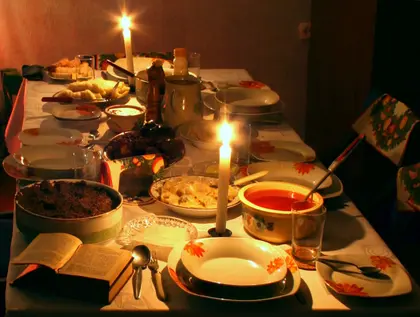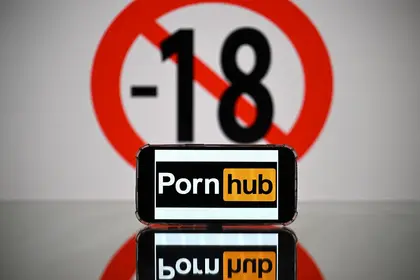In Ukraine, Christmas Eve is celebrated with a traditional 12-course meal on the festive table, which symbolize the 12 apostles of Jesus Christ. It opens with a small portion of kutia (sweet porridge of whole grains) and includes borsch, herring, and the remainder of the array of dishes.
This "holy evening" (sviat vechir) takes place on Jan. 6, because the major churches in Ukraine follow the Julian calendar, which is 13 days behind the Gregorian calendar used by the rest of the world.
JOIN US ON TELEGRAM
Follow our coverage of the war on the @Kyivpost_official.
However, this year Ukrainians will have the blessing of their church to celebrate Christmas on Dec. 25, which will put them in line with the vast majority of Christians – including the Orthodox from Greece, Romania and Bulgaria, who also celebrate on that date.
Ukrainians have traditionally commemorated the birth of Jesus Christ on Jan. 7, along with Georgians, Serbs, Armenians, Russians and a few other Orthodox Churches, including Coptic Orthodox Christians in Egypt.
What is the difference in calendars?
The Julian calendar was introduced by Roman general and statesman Julius Caesar in 45 BC.
It eventually standardized March 21 as the date of the vernal equinox and introduced a simple leap year rule: insert an extra day every four years.
Although this leap year rule is straightforward, it does not produce a precise match to the solar year.

‘We Are Blocking Propagandists’ – Zelensky Imposes Sanctions on Pro-Russian Politicians
Over the centuries, the gap between March 21 and the true vernal equinox grew to nearly two weeks.
The Gregorian calendar reform was introduced in 1582 by Pope Gregory VIII, essentially to make the calendar year more accurate with respect to the solar year.
The leap year rule for the Gregorian calendar differs slightly from that of the Julian calendar.
The Gregorian leap year rule is: Every year that is exactly divisible by four is a leap year, except for years that are exactly divisible by 100, but these centurial years are leap years if they are exactly divisible by 400.
For example, the years 1700, 1800, and 1900 are not leap years, but the year 2000 is.
Why the shift?
Since independence in 1991, Ukraine’s Orthodox churches have split along political lines: those loyal to the Moscow Patriarchate, and those loyal to the Kyiv Patriarchate.
The Orthodox Church of Ukraine – Kyiv Patriarchate (OUC-KP) announced in October that it would allow its faithful to celebrate Christmas on Dec. 25 rather than on Jan. 7.
This decision affects more than 7,000 churches and will be made on a parish to parish basis.
Ostensibly, the Church says the decision was made "for the purpose of organizing service for the faithful of the OCU, who were forced to temporarily find themselves outside the borders of Ukraine as a result of the war."
Yet it also serves to continue the Kyiv Patriarchate’s inexorable move away from Moscow’s influence.
The minority Ukrainian Greek Catholic Church (UGCC), which predominates in the western regions of Ukraine and the diaspora, and which has also traditionally celebrated Christmas on Jan. 7, decided that it would make a decision in concert with its Orthodox brothers and sisters.
They met in Lviv at a roundtable in late November to discuss the possibility of celebrating Christmas on Dec. 25, which was made an official holiday by presidential decree in 2017..
Basically, they permitted individual parishes to choose when to celebrate, but agreed to proceed gently due to the difficulties in making the switch.
Why so difficult?
Switching the date of Christmas is not just a matter of moving one celebration. It would effectively disrupt the entire liturgical calendar, with saints days, sermons and gospel readings all impacted.
Another reason for moving slowly is public opinion.
Just because Ukrainians want to break from Moscow’s tentacles politically, doesn’t mean they want to break with celebrating Christmas after the New Year, as they have always done.
A recent opinion poll conducted by the Rating sociological group shows that just 26 percent of the population supports a change; 58 percent oppose it; 71 percent will be celebrating Christmas in January, and only 4 percent in December.
A few festive souls, 18 percent of those polled, intend to celebrate Christmas twice. The scrooges who will not celebrate Christmas at all account for only 6 percent.
As with everything in Ukraine at the moment, the churches and their traditions are in a state of transformation.
Tradition, almost by definition, is resistant to change. But these days, whether they like it or not, Ukrainians must live by the motto "change or perish."
You can also highlight the text and press Ctrl + Enter










